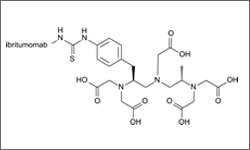Ibritumomab

Zevalin® is used to treat certain types of non-Hodgkin's lymphoma, including those that are unresponsive to rituximab alone. Zevalin® is given as a part of a regimen that takes 7 to 9 days to complete. On day 1 a low dose of rituximab (Rituxan®) is given. Within 4 hours of this infusion the first dose of Zevalin® is given. This dosage includes the radioactive element Indium-111. The location of this isotope in the body is visualized with imaging tests. These imaging tests are performed 2 to 3 times and by day 6 provide information about where in the body the radioactive antibodies are collecting. If the distribution of these antibodies is normal, a second, lower-dose infusion of rituximab is given on day 8-7 and within 4 hours of this infusion a second infusion of Zevalin® is given. This dose of Zevalin® includes a different radioactive isotope, Yttrium-90, that is capable of killing targeted cells. The rituximab infusion used in this regimen helps increase the specificity of Zevalin® binding to target cells.1, 2
Ibritumomab tiuxetan (Zevalin®) is a monoclonal antibody coupled with a chemical that can bind and carry radioactive elements. The antibody portion of the drug is directed against the CD20 antigen. The CD20 protein is present on the majority of mature B-cells, normal and cancerous, but not on B-cells in the bone marrow. The antibody is able to deliver the radioactive portion directly to target cancer cells, where the radiation kills the target cell and nearby cancer cells, while blocking cell activation and cell cycle progression.1
- 1 Chu, E., & DeVita, V. T. (2015). Physicians' cancer chemotherapy drug manual 2015. Burlington, MA: Jones & Bartlett Learning.
The Indium-111-fused antibody supplies very small amounts of radiation, therefore no special precautions are necessary after this infusion. However, the Yttrium-90-fused antibody could result in other people being exposed to radiation if these precautions are not followed until 1 week after treatment is finished: a condom should be used during sexual intercourse, refrain from deep kissing, avoid transfer of other body fluids (urine, saliva, blood and stool), wash hands after using the bathroom, it is recommended that contraception be used for up to 12 months after, treatment is finished. Common side effects include nausea and vomiting, abdominal pain, diarrhea, cough, shortness of breath, dizziness, loss of appetite, joint pain, nervousness, bruising. Blood cell counts become low in most cases, which may alter the body's ability to fight infections, decrease blood clotting, and cause weakness and fatigue. It is important that these counts be monitored and that no other medications that alter blood clotting be taken. Though the dosage of rituximab is lower in the Zevalin® regimen than when given alone there is still a chance of experiencing adverse effects associated with this drug. 1
- 1 Zevalin.. Prescribing Information. IDEC Pharmaceuticals Corporation. October, 2013. [http://www.zevalin.com/downloads/Zevalin_Package_Insert.pdf]
